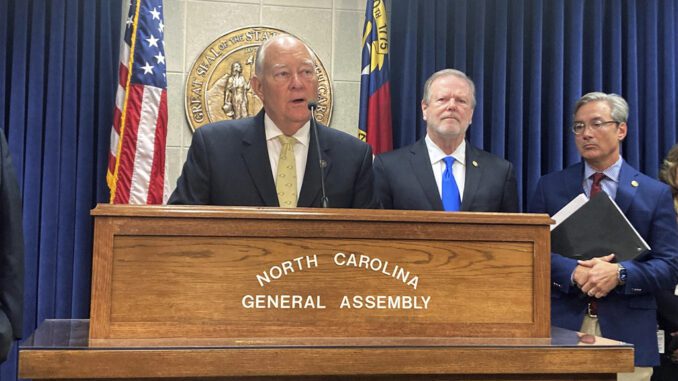
RALEIGH — At a press conference held on May 15, North Carolina Senate Republican leaders unveiled its budget proposal which maintains the same spending level as the version in the House – $29.8 billion for the fiscal year starting July 1 and $30.9 billion the following fiscal year.
In comparison, Gov. Roy Cooper’s budget proposal spends over $3 billion more than the nearly $61 billion two-year budget proposed by lawmakers.
The conference was led by Senate Leader Phil Berger (R-Eden) and included Senate Appropriations Chairs Sen. Brent Jackson (R-Sampson), Sen. Ralph Hise (R-Mitchell) and Sen. Michael Lee (R-New Hanover).
“This is a strong budget that addresses our state’s needs without breaking the bank,” Jackson said in a joint press release. “We increase spending where it is needed, bolster our reserves in light of economic uncertainty, and give money back to the hardworking people of North Carolina.”
“What we have been doing has been working, and this budget is largely a continuation of the responsible spending that has gotten us to where we are today,” said Hise.
Business and economic development is a centerpiece of the Senate’s proposal with $1.425 billion going to the nonprofit NCInnovation; a group established to advance and commercialize applied research at NC universities. Former Truist Bank CEO Kelly King chairs the organization.
Cooper and House leaders included only $50 million for NCInnovation’s work.
“I’m grateful to North Carolina’s legislators for their many months of work,” King said in a statement on the budget proposal. “NCInnovation’s model will be a game-changer for North Carolina, especially our rural areas that have the human talent but need support to press forward on commercializing research outputs.”
Berger indicated the budget would be heard in various committees and would see a floor vote before May 19.
Taxes
The House version reduces the personal tax rate from the current 4.75% to 4.5% for 2024 and 2025 and continues to reduce the rate down to 3.99% after 2026.
The Senate version also drops the current rate to 4.5% next year but continues to drop the rate down each year, reaching a rate of 2.49% after 2029.
Per Senate budget leaders, the cuts will result in $6.6 billion in tax savings for North Carolinians over the next five years.
Salaries
The Senate proposal appropriates $94 million into the Labor Market Adjustment Reserve (LMAR), doubles the LMAR allocation to state agencies and community colleges to 2%, and includes $15 million in LMAR funds for the UNC System.
State employees would get a 5% raise; 2.5% beginning this July and 2.5% the following year. Cooper’s proposal for state employees came in at 8% and the House has called for a 7.5% overall raise; 4.25% in the first year and 3.25% in the second year.
Raises for teachers would be 4.5% over the two-year budget. That’s less than half of what the House budget called for and Cooper called for an 18% raise over the biennium for teachers. Salary supplements for advanced teaching roles of up to $10,000 are also in the Senate’s budget. Under the proposal, average teacher pay will be $59,121 by the end of the 2024-25 fiscal year.
Starting pay for beginning teachers would see an 11% increase, going from $37,000 to $41,000. There are also various bonuses for teachers, including signing bonuses for teachers working in small or low-wealthy counties.
Cooper attacked the proposal on Twitter, calling the teacher raises “pitiful.”
“Senate Republicans propose a pitiful 4.5% raise for teachers spread over 2 years while giving tax breaks and private school vouchers to millionaires,” tweeted Cooper. “Disastrous. My budget proposes a much-needed 18% raise to keep quality teachers in the classroom.”
When asked by a reporter about items in the proposal such as tax changes and pay raises that may give the governor “heartburn,” Berger replied, “I gave up a long time ago trying to read the governor’s mind.”
Top elected officials in the state are also getting a raise.
The governor’s current salary is $165,750. That salary would increase to $198,120 as of July 1 this year and increase to $203,073 in July 2024 – a 22.5% increase over the next two years.
The Council of State would also see pay raises. Current salaries for the Council of State positions are $146,421 and would increase by a total of $21,963 over the biennium under the Senate plan.
Certain executive branch employees as well as judicial employees will also get a raise.
The House budget includes provisions for the appointment and term of the Director of the State Bureau of Investigations (SBI), whereas the Senate version does not.
Under the House version, the SBI will be its own stand-alone agency and no longer reside under the Department of Public Safety. Additionally, the removal of the director of the SBI’s by the governor is changed to require a three-fifth approval vote by both chambers of the General Assembly.
Education
The Senate proposal includes education spending of over $17.2 billion for 2023-24 and over $17.6 billion for 2024-25.
A new School Health Personnel Allotment is included that increases funding by $10 million in recurring funds to help public schools hire around 120 more nurses, counselors, social workers, and psychologists. Nearly $70 million is earmarked for developing and expanding community college courses in high-demand career field areas.
Both budgets refer to the popular Opportunity Scholarship Program (OSP) which gives grants to low-income students to attend the private school of their choice.
The House version of the budget increases the OSP’s funding levels, but the Senate version incorporates the expansion of the program to all families contained in a pair of bills currently moving through committees at the legislature.
House Bill 823 and its companion, Senate Bill 406 seek to make all K-12 students in the state eligible for opportunity scholarships using a sliding scale to assign grant amounts based on household income.
The Senate’s budget increases the OSP Fund Reserve by $105 million in FY 2023-24 and $163 million in FY 2024-25.
When asked if the inclusion of the OSP expansion in the budget was going to take dollars away from public schools, Berger said, “For every child that opts for it, that child is not a child being educated in public schools. It makes no sense to me to give public schools money for kids they are no longer educating.”
Healthcare
The Senate budget enacts Medicaid expansion and includes a $1.5 billion appropriation in non-recurring funds from the federal “sign-on” bonus for the expansion.
The $1.5 billion includes $370 million for NC Care Initiative between ECU and UNC Health systems including construction of 3 regional health clinics and rightsizing existing parts of their health systems, $96 million for rural loan repayment incentive programs for primary care and behavioral health providers, $60 million for start-up costs and expansion of healthcare programs at community colleges and $20 million for UNC-Pembroke’s new healthcare-oriented programs.
During the press conference, Hise said their proposal ”takes a sledgehammer” to Certificate of Need (CON) laws.
A major item described by Hise is the repeal of CON requirements for mobile MRI machines, linear accelerators, physician office-based vascular access for hemodialysis, and kidney disease treatment centers. It also repeals CON laws for ambulatory surgical centers and facilities with MRI machines in counties with a population under 125,000 that do not have a hospital.
Additional increases to Medicaid reimbursements are included for private duty nursing services from $45 per-hour to $52 per-hour as well as $15 million in each year of the biennium for the Free and Charitable Clinics to provide care to low-income families and individuals across the state.
Additionally, the Senate budget adds language barring the use of state funds for abortion.



